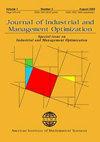基于低秩张量三重分解的高光谱超分辨率
IF 1.6
4区 工程技术
Q3 ENGINEERING, MULTIDISCIPLINARY
引用次数: 0
摘要
高光谱图像(HSI)和多光谱图像(MSI)融合的目的是产生超分辨率图像(SRI)。本文通过低秩张量三重分解,建立了图像融合问题的非凸优化模型。利用L-BFGS方法,我们开发了一种一阶优化算法来获得所需的超分辨率图像(TTDSR)。此外,还提供了两种计算目标函数梯度的详细方法。借助于Kurdyka-Lojasiewicz性质,证明了迭代序列收敛于一个平稳点。最后,在不同数据集上的实验结果表明了该方法的有效性。本文章由计算机程序翻译,如有差异,请以英文原文为准。
Hyperspectral super-resolution via low rank tensor triple decomposition
Hyperspectral image (HSI) and multispectral image (MSI) fusion aims at producing a super-resolution image (SRI). In this paper, we establish a nonconvex optimization model for image fusion problems through low-rank tensor triple decomposition. Using the L-BFGS approach, we develop a first-order optimization algorithm for obtaining the desired super-resolution image (TTDSR). Furthermore, two detailed methods are provided for calculating the gradient of the objective function. With the aid of the Kurdyka-Lojasiewicz property, the iterative sequence is proved to converge to a stationary point. Finally, experimental results on different datasets show the effectiveness of our proposed approach.
求助全文
通过发布文献求助,成功后即可免费获取论文全文。
去求助
来源期刊
CiteScore
2.50
自引率
15.40%
发文量
207
审稿时长
18 months
期刊介绍:
JIMO is an international journal devoted to publishing peer-reviewed, high quality, original papers on the non-trivial interplay between numerical optimization methods and practically significant problems in industry or management so as to achieve superior design, planning and/or operation. Its objective is to promote collaboration between optimization specialists, industrial practitioners and management scientists so that important practical industrial and management problems can be addressed by the use of appropriate, recent advanced optimization techniques.

 求助内容:
求助内容: 应助结果提醒方式:
应助结果提醒方式:


